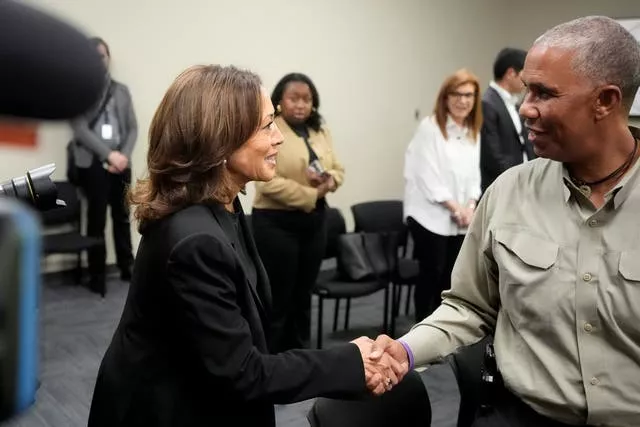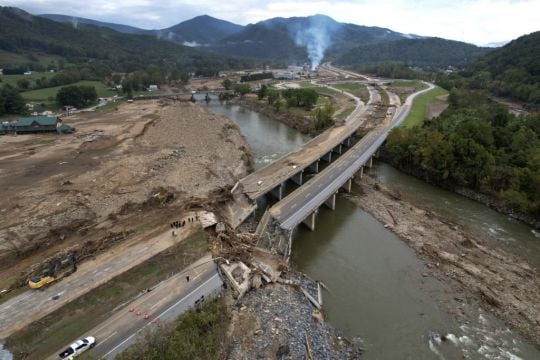Democratic US presidential candidate Kamala Harris pledged ongoing federal support and praised the work of strangers helping strangers as she visited North Carolina on Saturday in the aftermath of Hurricane Helene, her second trip in four days to the disaster zone.
The vice president was in Charlotte one day after a visit to the state by Republican candidate Donald Trump, who is spreading false claims about the federal response to the disaster.
Ms Harris began by attending a briefing with state and local officials, where she thanked “those who are in the room and those who are out there right now working around the clock”.
She promised federal assistance would continue to flow and praised the “strangers who are helping each other out, giving people shelter and food and friendship and fellowship”.

Despite Mr Trump’s claims that the federal response in the state has been “lousy”, Democratic governor Roy Cooper said the state was “deeply grateful for the federal resources that we have.
“FEMA has been on the ground with us since the very beginning,” he said, referring to the Federal Emergency Management Agency.
Earlier in the week Ms Harris was in Georgia, where she helped distribute meals, toured the damage and consoled families hard-hit by the storm.
President Joe Biden, too, visited the disaster zone. During stops over two days in the Carolinas, Florida and Georgia, Mr Biden surveyed the damage and met farmers whose crops have been destroyed.
They have been vocal and visible about the government’s willingness to help, and the administration’s efforts so far include covering costs for all of the rescue and recovery efforts across the south east for several months as states struggle under the weight of the damage.

In a letter on Friday to congressional leaders, Mr Biden said that while FEMA’s Disaster Relief Fund “has the resources it requires right now to meet immediate needs, the fund does face a shortfall at the end of the year”.
He also called on lawmakers to act quickly to restore funding to the Small Business Administration’s disaster loan programme.
More than 200 people have died in the worst storm to hit the US mainland since Katrina in 2005, and scientists have warned such storms will only worsen in the face of climate change.
But in this overheated election year, even natural disasters have become deeply politicised as the candidates crisscross the disaster area and in some cases visit the same venues to win over voters in battleground states.
Mr Trump has falsely claimed the Biden administration is not doing enough to help people in Republican areas and has harshly criticised the response.

He has, in Helene’s aftermath, espoused falsehoods about climate change, calling it “one of the great scams of all time”.
During a stop in Fayetteville, North Carolina on Thursday, Mr Trump renewed his complaints about the federal response and cited “lousy treatment to North Carolina in particular”.
In fact, Mr Cooper said this week that more than 50,000 people have registered for FEMA assistance and about six million dollars (£4.5 million) has been paid out.
Ms Harris’ visits present an additional political test in the midst of a humanitarian crisis.
She is trying to step into a role for which Mr Biden is well known, showing the empathy that Americans expect in times of tragedy, in the closing stretch of her White House campaign.
Earlier this week, I called Asheville mayor Esther Manheimer to see how our Administration can continue to support relief and recovery efforts in western North Carolina.
I look forward to seeing her and other state and local officials today as we discuss our ongoing work. pic.twitter.com/oHN9Q15lQQ— Vice President Kamala Harris (@VP) October 5, 2024
Until this week, she had not visited the scene of a humanitarian crisis as vice president. That duty was reserved for Mr Biden, who has frequently been called on to survey damage and console victims after tornadoes, wildfires, tropical storms and more.
Ms Harris said this week that she wanted to “personally take a look at the devastation, which is extraordinary”.
She expressed admiration for how “people are coming together. People are helping perfect strangers”.
She said that shows “the vast majority of us have so much more in common than what separates us”, an echo of a line she frequently uses on the campaign trail.
“We are here for the long haul,” she said.







